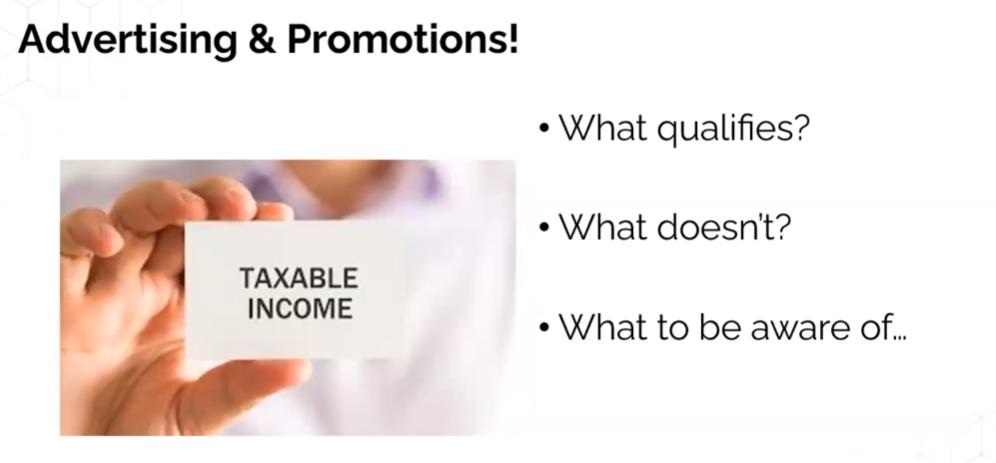Advertising and Promotions Summary
Advertising and promotion are valid and important business functions. You grow a business in part through targeted advertising and promotional activities. This is a discussion of where some businesses can mistakenly catch the attention of IRS auditors. Learn what you can and cannot do.

Advertising and promotions are business functions that can have blurred lines when it comes to deductibility. This is in part because some things that the business may consider as valid promotions that build business may not be considered fully deductible or deductible at all by the IRS. In this resource, what qualifies, what does not, and rules to be aware of are covered.
IRS Definition of Advertising & What is Included
Here is how the IRS defines advertising that is an expense-deductible function of business: “Advertising includes messages containing qualitative or comparative language, price information or other indications of savings or value associated with a product or service, an endorsement or an inducement to purchase, sell or use the sponsor's company, service, facility or product.”
Simply put, this means that valid advertising expense is 100% deductible.
What is Deductible
Some of the valid expense line items for advertising that are less traditional include:
- Websites
- Vehicle wraps (the cost of the wrap)
- Radio commercials
- Podcast sponsorships
What is NOT Deductible
You cannot deduct these expenses as advertising:
- Entertainment (as if 2018)
- Political contributions
Clarifying Deductibility
These are areas that bring up questions from clients. Some clarification here can help in understanding what is and is not deductible.
What you can deduct:
Here are some areas of deductibility that usually generate questions from clients:
- Swag – This can be t-shirts, flyers, hats, etc. Not only can you provide promotional clothing that benefits your employees, the promotional value to the company of logo clothing makes it a deductible promotion expense.
- Online Presence – Money that you spend on creation and maintenance of a website is deductible. Promotion of that site through paid ads on social media is as well. You can deduct fees paid to social media influencers to promote your business to their followers.
- Signage – For businesses with locations on main traffic roads or in high traffic areas, signage like billboards can bring in a lot of business and the expense is deductible. One area of special treatment with signage is how long it is in use. The IRS says that signs placed for less than one year can be deductible(depreciated) in full that tax year. Signs in place for more than a year must be depreciated like a commercial improvement to the structure over 39&1/2 years.
- Public Relations – These are activities like sponsorships of youth sports teams, sports tournaments, educational events, etc.
What you cannot deduct:
These are things that are sometimes mistakenly entered as deductible but are definite No-Nos when it comes to the IRS.
- Personal Hobbies – Hunting, fishing, golf, and football are examples. Even if business is discussed during games or sporting trips, it is not a deductible expense item.
- Non-business, Primarily Personal Expenses – This would include weddings, haircuts, meals,
What to Look Out For
These are areas where you can save tax dollars or should be careful about:
- Prepay Advertising Expenses – If you know that you are going to have an advertising expense in the next year, you can accelerate the payment into the current tax year to get the deduction.
- Don’t Get Too Creative – This is an area that became even more of a minefield after the Tax Cuts and Jobs Act in 2018. Entertainment expenses were cut out as deductions in the Act, but many businesses are still trying to take deductions by relating expenses to some business purpose. The IRS is watching for this.
The Bottom Line for Adverting & Promotion Deductibility
Creativity works great for artists, fiction writers, and actors, but not so much for business owners. A little creativity in deductions can work, but an inch too far and the IRS will catch it. This is where the services of an expert team of tax advisors can help you to take advantage of every legal deduction while avoiding that audit letter by becoming too creative.
© Copyright 2021 Tax Hive. All rights reserved.
Tax Hive, LLC (“Tax Hive”) is owned by Tax Hive Partners, LLC, a registered Certified Public Accounting (CPA) tax advisory firm. Tax Hive sources a network of separately licensed service providers that specialize in helping small businesses optimize their business structures. Professional services are fulfilled by appropriately licensed and registered service providers.
The information contained in this website is educational and intended only to assist in financial organization and decision-making – it is not intended to provide specific or individualized legal, tax, investment, or financial advice. Tax Hive is not a financial planner, broker, investment advisor, or law firm. Professional services are fulfilled by appropriately licensed and registered service providers.
Each personal financial situation is unique, and any information obtained using this website or its related services may not be appropriate for all individuals in all situations. Before making any final decisions or implementing any financial strategy, consider obtaining additional information and advice from an attorney, accountant, or other financial advisors that are fully aware of individual circumstances.
Account executives, customer relationship management, and other personnel are not licensed service providers. Such personnel may assist in providing a description of products and services offered and may arrange for specific advice to be provided through consultation with appropriately licensed and registered individuals – these staff members cannot provide personalized accounting, legal, business structure, or other tax advice.

